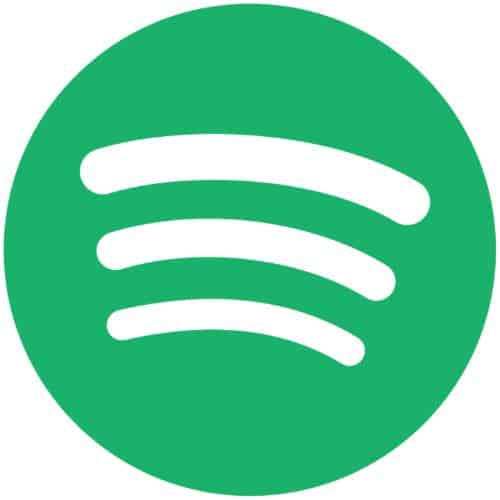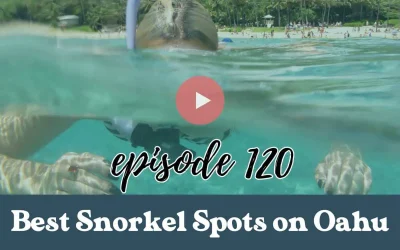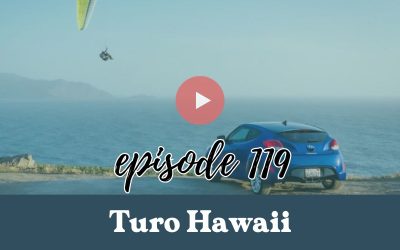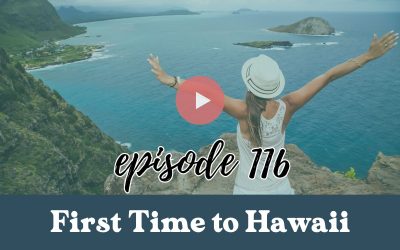Episode 117: Koloa Rum Company: What Makes Hawaiian Rum Unique?
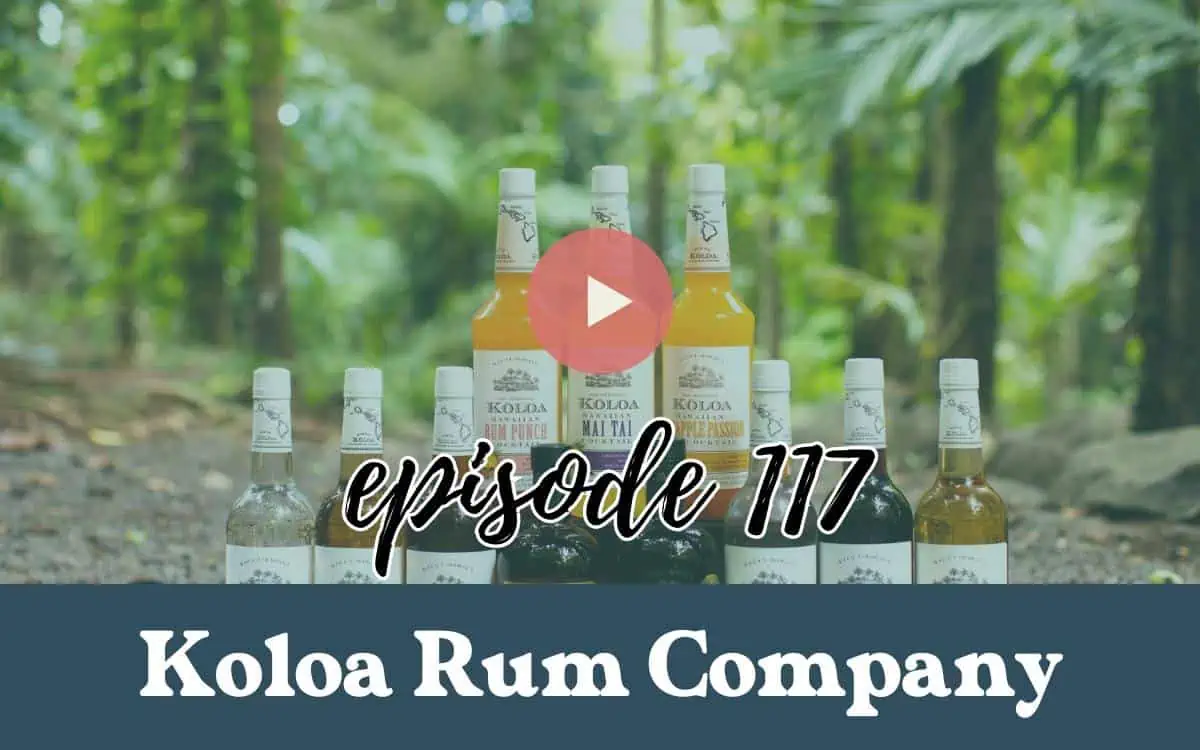
Today, we’re venturing into the lush landscapes of Kauai to explore a story steeped in heritage, culture, and the smooth, rich flavors of rum.
Join me as we sit down with Bob Gunter, President and CEO of the Kōloa Rum Company, a beacon of Hawaiian tradition and a testament to the island’s rich history of sugarcane cultivation.
Why listen to this episode? Because it’s more than just about rum. It’s a journey through time, a celebration of Hawaiian culture, and an exploration of sustainable practices that make Kōloa Rum a symbol of true aloha spirit.
Whether you’re a rum aficionado, a lover of Hawaiian history, or someone who cherishes sustainable travel, this episode offers something for everyone.
Planning a trip to Hawaii? Have any questions? Join our Hawaii’s Best Travel Facebook group here now! It’s the perfect place to ask any questions and to be inspired!
This post may contain affiliate links, meaning that I may earn a commission if you use a link provided.
This post gives general info and isn’t legal or authoritative advice. It helps travelers with tips but can’t replace personal abilities, fitness, experience, or local knowledge. Marine activities have risks; assess conditions and follow local laws.
The Legacy of Sugarcane in Hawaii
The history of sugarcane in Hawaii is as rich and complex as the flavors of Kōloa Rum itself. Sugarcane cultivation dates back to the ancient Polynesian voyagers, marking the beginning of an era that would shape the islands’ agricultural and economic landscape. Bob Gunter shares the fascinating journey of sugarcane and its pivotal role in Hawaiian culture, leading to the establishment of the Kōloa Rum Company in 2009, amidst the fading echoes of commercial sugar production.
Nestled on Kauai, also known as The Garden Isle, Kōloa Rum Company has been distilling premium Hawaiian rums crafted from pure cane sugar and rainwater from Mount Waiʻaleʻale. This commitment to local sourcing not only honors the legacy of sugarcane in Hawaii but also supports the local economy, providing employment opportunities and preserving the agricultural land that is so vital to Kauai’s identity.
Sourcing Locally: A Sustainable Philosophy
In our conversation, Bob Gunter emphasizes the importance of local sourcing, a philosophy that lies at the heart of Kōloa Rum Company’s operations.
By relying on locally grown sugarcane, Kōloa Rum is not just crafting spirits; it’s sustaining a tradition and supporting the local community.
This approach not only ensures the highest quality of ingredients but also aligns with the company’s dedication to environmental stewardship and sustainability.
Topics Discussed in This Episode
- The historical significance of sugarcane in Hawaii and its cultural impact.
- The inception and evolution of Kōloa Rum Company, including its challenges and triumphs.
- The importance of local sourcing and sustainability in Kōloa Rum Company’s business practices.
- Insights into the unique visitor experience at the Kōloa Rum distillery.
Join us as we uncover the story of Kōloa Rum Company, from its humble beginnings to its rise as a symbol of Hawaiian heritage and sustainable practices.
It’s a tale of passion, perseverance, and the spirit of aloha that resonates through every bottle of rum they produce.
Mahalo for tuning in, and remember to subscribe to Hawaii’s Best Travel for more stories that bring the spirit of Hawaii to you, no matter where you are in the world.
Until next time, aloha and safe travels!
Listen On:
Resources
Find out more about today’s guest…
Self-Guided Island Tours
Travel Pono (responsibly)
- Pono Pledge Website
- Episode 70 – How to Volunteer in Hawaii
-
Episode 87 – How to Travel Responsibly to Hawaii
Connect With Us
- Buy Me a Coffee
- Send Us a Message with any questions about Hawaii
- Hawaii’s Best Instagram
- Join our Hawaii’s Best Travel Facebook group here now! It’s the perfect place to ask any questions and to be inspired!
Bumper music, Ukulele and Chill, provided by Coby G (used with permission)
Bumper music, Aloha Friday, provided by Clay D (used with permission)
Spread Aloha
- Leave an honest review and follow us on Apple Podcasts
Related Posts
Episode 120: Top 5 Best Snorkel Spots on Oahu: What to Know Before Snorkeling in Hawaii
In this solo episode, hosted by Bryan Murphy, we dive into the crystalline waters of Oahu to discover the best snorkel spots on Oahu. Whether you're dipping your toes into the world of snorkeling for the first time or you're an experienced diver seeking new...
Episode 119: Turo Hawaii: Transforming Hawaii Travel with Local Insights
Today, we delve into an innovative approach to experiencing the islands: Turo Hawaii. With special guests Catherine Mejia and Leonani Puailihau from Turo, the leading car-sharing marketplace, we explore how this service offers a more personal, impactful, and...
Episode116: First Time to Hawaii: An Unforgettable Beginner’s Guide to the Islands
Are you planning your first trip to Hawaii and feeling overwhelmed with the plethora of information out there? Well, you've just struck gold! In this comprehensive podcast episode, I will be your personal guide to unraveling the mystique of Hawaii's enchanting...
[00:00:00] Bob Gunter: The history of sugar cane, uh, on white and in Hawaii is long and, uh, very significance in terms of, uh, our heritage and culture here. Bob Gunter is the president and CEO of Klo Rum Company. Klo Rum is located on the island of Kauai and has been around since 2009. However, the history of sugar and rum production on the island of Kaua'i dates back all the way to 1835.
[00:00:29] And in this conversation with Bob, we got to hear a lot about the history of the sugar mills on Kaua'i and how today Kaloa rum is sourcing locally. This is one you're not going to want to miss. Stay tuned. Let's cue the intro. Aloha. Welcome to Hawaii's best here. You'll learn what to know before traveling as we discover Hawaiian culture, local businesses, and the experiences that make Hawaii one of the most incredible places in the world.
[00:00:58] And now your [00:01:00] host, Brian Murphy. Thank you so much for tuning in today. I'm so excited that you are here. If you're new here, go ahead and hit subscribe. And drop a review below that just lets other people who love Hawaii be able to find this podcast and this conversation. Well, I am just so excited for today.
[00:01:19] So let's go ahead and get into our conversation with Bob Gunser from Kaloa Rum Company and talk story.
[00:01:33] Well, Bob, thank you so much for joining us today on Hawaii's Best. How are you doing today on this beautiful Monday? Uh, doing very well. Thank you. Appreciate you taking time to, to, to call and talk. Absolutely. Tell me a little bit about yourself and your role at Kaloa Rum. Well, I am the president and CEO of Kahloa Rum Company.
[00:01:56] We formed the company back, uh, actually [00:02:00] incorporated in 2006, uh, but we began to design and permit and build out our distillery beginning in early 2008. And we completed that process and actually began bottling and selling rum in September of 2009. And so this September, we'll make 10 years having been producing rum here on the island of Kauai.
[00:02:29] That's great. When did you come on with the company? I, uh, came on in the beginning. That is early, early 2008, when the decision was made to, uh, actually move forward and, uh, begin the construction, uh, design and construction and build out of the distillery. So I was on board from the beginning, went through the permitting process and, and got us to the point that we were actually making rum and then, uh, have been.
[00:02:56] And of course, uh, in the position since then. From the [00:03:00] beginning stages, what was the vision behind starting Kaloa Rum Company? Well, for myself personally, um, I've lived in Hawaii for many years and, uh, and worked in the sugar industry here on Kauai for a good many of those years. And, uh, so my heart is in, uh, in sugar cane.
[00:03:20] And, of course, now all of the commercial. Sugar plantations operations have closed, which is very sad to to many of us who grew up, lived and worked, you know, during that era. And so now being able to, to actually plant grow and otherwise use sugarcane grown your own to make rum really brings it full circle for me.
[00:03:47] And, uh, it's really gratifying to, to keep that, uh, that, heritage, that history alive here on Kauai. Uh, over the years I've worked on [00:04:00] two different, uh, micro distillery projects, uh, on the island of Maui, which is really where I was introduced to the industry and distillery operations. And through the five or six years that I worked on those two projects, I gained a lot of experience and knowledge of the business and, and, and equally important was able to meet a lot of Uh, key people who had, uh, industry experience.
[00:04:26] And so when we began to conceptualize and put colo or rum together, um, I was able to call to use that experience that I had gained on those 2 projects and also was able to bring in some consultants that I had met over the years and, uh, had them on hand to assist in the very early stages. You know, uh, putting the, the, the project, uh, together, you're getting to your, uh, I guess the, the, the key part of your question at the beginning, our intent was to help support our sugar [00:05:00] industry here in Hawaii.
[00:05:01] At that time, we still had several plantations, uh, in operation producing sugar, and we also wanted to do our part in, uh, helping to preserve the agricultural industry here. In Hawaii and help to diversify our economy, which is, of course, heavily dependent on tourism, and we wanted to create employment opportunities for our local people in doing.
[00:05:29] So, of course, we had hoped to eventually be successful and perhaps make some money, but it really was a combination of all of those things that, uh, You know, what's behind the, the initial concept and, and I guess the motivation to, to, to put this project together and, and see it through. I think that's great.
[00:05:50] A lot, a lot of people I talk to, they highlight the importance of sourcing locally and doing whatever they can to utilize, um, local production. [00:06:00] And you kind of answered this question, but why, in your opinion, does that matter sourcing locally? Well, it's especially important for those of us who live in Hawaii.
[00:06:11] I mean, we do live on islands. And so we, we're also, Hawaii is, is of course the most remote. Populated archipelago in the world. And so, um, we sustainability and being able to, to survive on products and goods and services that are produced locally, um, just makes sense because we're, it's a long way to the mainland and it takes a lot of time to get products, goods and services, supplies and so forth, uh, shipped in for the mainland.
[00:06:44] And it's also very expensive. Uh, in terms of freight, 90 percent of consumables in Hawaii are shipped in the ocean freight and the free rates. Unfortunately, in Hawaii, ocean freight rates are are very, [00:07:00] very expensive. So, from a, from a business perspective, in terms of. Cost and so forth. It just makes sense to source as many products and goods and services locally as we can.
[00:07:13] And it also, um, serves to, uh, you know, provide jobs, you know, and economic diversity here in, in Hawaii. Right. And later on, I, you know, I'm excited to talk a little bit more about how you guys, your guys's plans and expanding that, but maybe before we get there in these. Past 10 years now, which is kind of cool marker.
[00:07:33] What have you seen being the attributing factors to your guys's success? Well, first and foremost, I think what's notable is that all of us that are involved, most all of us involved in Koloa rum from the beginning are either from Hawaii originally or have lived and worked here for many years. So we're we're homegrown.
[00:07:55] And so we really were not. I often Tell [00:08:00] people sort of jokingly that, uh, we're not a bunch of Harvard MBAs with pockets full of venture capital who thought it would be cool to go out to Hawaii and build a rum distillery. Most of us are, you know, homegrown and, uh, and this is, you know, important for us.
[00:08:18] And also, um, we failure was not an option. That's an I said often use a phrase, but, you know, we, we literally put those of us who provided the capital in the beginning to get this started really had to make it be a success or, you know, the alternative would not be pleasant. Then we also realize that manufacturing in Hawaii is daunting from any perspective, but especially the cost of doing business here and manufacturing is really an expensive proposition.
[00:08:52] Yeah, again, going. The fact that we're so remote and having to having so many things shipped in and out, you know, [00:09:00] it's not a level playing field for those of us who are involved in manufacturing and in Hawaii, in terms of being able to compete outside of the state, which we certainly, we certainly do. But we, we decided there was no way that we would be able to compete on price of our product, because it would be more expensive to produce it.
[00:09:21] So we decided that it would make better sense. For us to, to focus on making superior products and compete all the quality of product and the uniqueness of those products, meaning that they're made in Hawaii, which is unique. Most people don't associate Hawaii with a being a rum producing region or distilled spirits producing region and we would.
[00:09:47] Leverage that uniqueness through our visitor industry. Last year, we had almost 10 million visitors to the state. And of course, that's a market that we certainly [00:10:00] do our best to leverage. And every 8 to 10 days, we get a new set of visitors coming in and they're coming from all over the world. But, you know, of course, mostly North America and, you know, the 48 states.
[00:10:13] And so, um, having the ability to introduce our products to those people coming from all these different places, um, we thought was an advantage that we could exploit. And so, Again, we wanted we knew that we couldn't compete on price. We had to compete on the quality of the product and and do our best to leverage our visitor industry.
[00:10:34] And that was what we thought was our competitive edge in retrospect. Now, looking back, that has worked for us. Yeah, definitely. Anytime I'm over on Kaua'i, coming to your guys's facility, the way you guys have it laid out and even the tasting room, I wonder if you can speak into a little bit about if someone's coming to Kaua'i for a visit, what type of experience are you hoping that they walk away from Koloa Rum?[00:11:00]
[00:11:00] First and foremost, we're always welcoming visitors and happy to have people come and experience. The island of Kauai, the Garden Island, uh, the oldest island, geologically speaking, and the chain, and we think looks beautiful. We also want them certainly to, you know, to have the opportunity to try our rums and get a sense of, uh, the quality of the product and, and the fact that it's, it's all done here.
[00:11:28] All of our distilling, blending, bottling, packaging, uh, shipping is done right here from the, uh, from the island of Kauai. And the fact that we're growing more and more of the sugarcane that is being incorporated into making our products. This is exciting and something that we're, we're eager to share with people, but we also at our tasting room, um, a couple of things that I think are unique, especially when compared to some of the wineries on the mainland and so forth is that we don't charge.[00:12:00]
[00:12:00] For our tastings and we don't we never will. So it's completely free to the public. And during the actual tastings, our bartenders give a brief overview of the history of Hawaii, the history of Hawaii. the history of the sugar industry and sugarcane in Hawaii and then, uh, and then afford them the opportunity to try three or four or five of our, our different products on any given day.
[00:12:30] And hopefully they go away with more information. Um, in a better sense of what the island is all about and what our, our, our philosophy is, if you will, about making rum and, you know, and doing business here. In rum production in general in Kauai, in 1837, there was the first harvest of sugar. Rum production was also started.
[00:12:53] What has rum production been like? In those years on Kauai, have they been non [00:13:00] existent or more just smaller productions? What we do know is that the first successful sugar mill, the first one in Hawaii, was started in Koloa on the island of Kauai. And that first operation, that first mill, the company was called Lad and Company, and it also represented the first commercial land lease that was ever awarded by the Hawaiian monarchy.
[00:13:27] Oh, okay. That that was many years before, uh, statehood. Right. And it was from that first, that first planting in 1835 and the first harvest two years later, That was the beginning of the, the sugar industry in Hawaii. Which for many years was like, was the, uh, agricultural and commercial operations in Hawaii.
[00:13:50] And at one point there was upwards of 150 different independent sugar mills around the state. But the very first successful [00:14:00] mill that ran continuously up until the 2000s was the Kaloa Mill. We also know from, uh, the ship's logs from Captain James Cook's days when they first discovered Hawaii, at least as far as the Western world's concerned, back in 7th of the 8th, they found sugarcane growing in the Koloa district.
[00:14:22] So we know that sugarcane predates Western contact in Hawaii, and that it was brought by the ancient Polynesian voyagers on their migrations up from Tahiti, the Marquesas, and other South Pacific islands. So the history of sugarcane in Hawaii is long and very significant in terms of our heritage and culture here.
[00:14:47] Not only recently, I see in the last few years, the last sugar mill closed that was on the Big Island. Is that right? No, that was actually on Maui. Oh, okay. When we began producing rum here in [00:15:00] 2009, there was an operating sugar mill here on Kauai. Okay. Gay and Robinson Plantation, and it closed in the winter of 2010, December 2010.
[00:15:11] And when that happened, we purchased 60 tons of sugar, raw sugar from them, last us for some period of time, and it lasted us about A year and a half or two years and then we began purchasing sugar and shipping it in from HC& S plantation Hawaiian commercial and sugar company over in Maui and we continued that, uh, relationship until they announced that they were closing about two years ago and then we contracted with them to buy 190 tons of sugar from them from their last harvest and we had it Shipped over and stored here on Kauai, and we've been using that sugar You know since then and we're down now to approximately right [00:16:00] about a hundred tons left So that's another couple years supply for us Depending on how demand goes and so we're really ramping up our Cane planting and cultivation.
[00:16:14] We're soon planting another 10 acres of sugar cane in Koloa town near the site of our where our new distillery will be built in the next year or so. And we also have a cane field out on the on the west side of the island out on former Gann Robinson. Plantation land where we are growing cane and we are harvesting, crushing that cane and using the juice to supplement the raw sugar that we use in in making our rum.
[00:16:44] And so our objective is to over the next year and a half or 2 years to to plant as much more acreage as we are able to so that we can hopefully get to the point that. That we could be self sustaining with [00:17:00] Kane that we, that we grow here or have others grow for us here, uh, on Kauai. That's great. As you are expanding and in your own personal leadership and leading the company, how do you balance or how do you lead from Aloha, I hear that a lot from business owners, how to lead a business with aloha at the forefront.
[00:17:25] That's an interesting question. You know, I mentioned earlier about, uh, living on islands and, uh, and in doing so, uh, you know, we tend to have, we speak a lot about, uh, Ohana, which is of course, family and those of us, uh, who live and work here, we know. Everyone knows everyone else for the most part. Um, and so we're very close knit and, and, and also just by nature of living on islands, we, we tend to be self reliant, but also in interdependent.
[00:17:57] We depend on each other. We have to. And [00:18:00] especially in times of need. So there there is a sense of family again with us here and in terms of any type of business philosophy, we, we strive to be above board, straightforward, transparent. I mean, you pick the descriptive words, but, um. We, we want to conduct ourselves in a way that would bring pride on each of us who work here and also on our, our island and our state, because especially when we're outside of Hawaii, our rums are sold now in 27 states and three countries, we are representing Hawaii.
[00:18:41] And we take that very seriously. So, you know, again, we conduct our business and ourselves with, uh, with that in mind that we, yeah. Uh, that we are representing the people of, of Kauai and the state of Hawaii, uh, in, in, in doing that. And that's also reflected in the efforts that we put into [00:19:00] making superior products.
[00:19:01] Uh, you know, is that again, we want it all to reflect well on our, I, I love that. And as you are putting yourself in that posture of Aloha and thinking about someone who's coming to Kauai for a visit. From your perspective, some of your advice, what are some things that you would want people coming to the island to know?
[00:19:26] Obviously, you're going to want to stop at Kuala Lumpur and you're going to want to do that. But what are maybe some other things that you would want someone coming to Kauai for a visit? Maybe there's some tips or maybe there's some etiquette just to be aware of before coming. Oh, that's interesting. And uh, yes, Hawaii is unique.
[00:19:44] And it's, uh, it's totally different than, uh, than any other place, uh, on the mainland or even Alaska, you know, it's unique and we do have a host culture here, uh, and that is of course, the Hawaiians and other [00:20:00] cultures that migrated here over the. the millennia, you know, to work in the sugar industry and the pineapple industry and so forth.
[00:20:07] And so there is no true ethnic majority or minority that, you know, we're pretty evenly balanced. Uh, and so it's a very unique demographic here and one that you won't find anywhere else, at least that I've seen. And, uh, and that's, you know, one of the beautiful things I think about Hawaii. Um, yeah. And so when people come, especially those who've never been here before, my 1st suggestion would be once you keep playing, take a deep breath and realize that you're not on the mainland anymore.
[00:20:39] And that you're in a special place and just relax. And then I would encourage people at the 1st opportunity to take the 1st step and speak and engage with. With local people, because you will not, and I, and I based this on my many, many years of living here. It says you will not find any more gentle [00:21:00] and genuine and hospitable people anywhere on this earth than you'll find here on Kauai and in Hawaii in general.
[00:21:09] I love that. In your time on Maui, I'm curious, how would you compare those islands, Maui and Kauai? Oh, well, they're different, but yet they're similar. You know, we have eight major islands in Hawaii. The big island on Hawaii where the volcano is, of course, is the newest island geologically, a little over 500, 000 years old.
[00:21:30] Uh, but still growing, uh, with the volcanic activity. Kauai, on the other end of the archipelago, is the oldest island geologically, and it's billions of years old. And so, um, and in between, of course, you have Maui and Oahu and, uh, and so forth. Kauai is the fourth largest island geologically and by population, and Maui is the second.
[00:21:52] Largest and in terms of, uh, geography or land mass. Um, and second most populous to a lot of [00:22:00] where Honolulu is. Each of the islands are different. Uh, they're, they're, they're beautiful in their own way. I originally moved from the mainland to Hawaii many years ago and I lived on Kauai and worked here for many years before eventually moving to Maui and where I lived for 14 years.
[00:22:17] And then move back to Kauai. I love Maui. It's a beautiful place. It's a little different than, than Kauai. Uh, but, um, they're, they're both, I think, uh, very beautiful. But if I had to say my preference, uh, that would be, that would be Kauai. Yeah. I'm curious. Um, someone's coming to Kolo Rum for the first time.
[00:22:40] What have you guys seen being some of the most popular products that you guys have? We do a full portfolio of products. Um, we do seven rums, uh, we do our standard white, which is just pure rum. Great for mojitos and daiquiris and the like, uh, we do a gold rub, [00:23:00] um, which is, uh, quite nice. And both the white and the gold are just pure rums.
[00:23:06] And then we have a, uh, a flavor category. We do our dark rub, which has a very bold, uh, vanilla note, and we use Tahitian vanilla when it's available. It's absolutely delicious and, uh, it's a great float on a cocktail. And also, uh, some of the bakers use it in cooking. And, uh, we actually have a baker that makes a delicious rum cake, uh, that we sell in our store, made with our dark rum.
[00:23:35] And then we have our own version of, uh, spice rum, our Kauai spice that has our proprietary blend of spices and flavorings. And then we have an all natural 80 proof coconut rum, which is, you know, I think outstanding and because it's a, it's a ROM, it's 80 proof, it's a full strength and it's, it stands up really well in [00:24:00] cocktails and a lot of the mixologist, the bartenders like to use it because again, because of the flavor profile, but also the, you know, the strength that 80 proof it's a, it's a, it's a great cocktail rum.
[00:24:11] And then we do our coffee rum, which is a collaboration between us and Kauai Coffee Company, which is here on Kauai. And just a footnote, uh, Kauai Coffee Company is the largest, uh, coffee farm in the United States. It's comprised of 3, 700 acres, and they grow a variety of different coffee beans and they do a special roast and grind for us and then we do a cold brew process and then blend that freshly brewed coffee with our white rum and add a little bit of cane sugar.
[00:24:48] Oh, wow. That sounds amazing. We bottle it at 68 groups, so it's a barely a liqueur, but it's absolutely delicious. And then we do our Kauai reserve rum, [00:25:00] aged rum. It's a minimum of three years of age. And those are H didn't want you. It's bourbon barrels that we bring in from Kentucky. Um, and that is, uh, just some of the best sipping rum.
[00:25:13] I think you'll find anywhere and then we can have our line of ready to drink cocktails. You mentioned the rum punch that's featured on board Hawaiian airlines. That's lovely. It's a passion orange guava base with our white rum. And then we also do what we call pineapple passion. Which is pineapple and passion fruit puree with our white rum.
[00:25:35] And then we do a standard colo on my tie cocktail ready to drink. Do you have a personal favorite go to drink? I love the cocktails. But my favorite of the rums, I would say, would be our kawaii white rum. You know, it's pure rum, nothing added, no sugar or glycerin added back to it. And, uh, [00:26:00] I think it's extremely clean and smooth and, and just, uh, very sippable.
[00:26:07] And it also mixes well, um, so it's good neat or straight or mixed with most any, uh, in any cocktail. Bob, I just want to say thank you so much again for your time and I look forward to coming and visiting the new facility in about a year or so and look forward to more updates from you guys. How can people find you and connect more with Kahloa Rum?
[00:26:28] Of course, our website, KoloaRum. com is a good starting point and on the website, you will find a tab that says, find our rum and visitors can put their city or zip code in and then click enter and then they will see a populated list of stores or bars that carry our rum in their area so they could find it outside of Hawaii and otherwise, uh, You know, of course, we're on Facebook and Instagram, you [00:27:00] know, at hello around a lot of conversations and a lot of information sharing and pictures of what lad always available through social media.
[00:27:08] So, and our tasting room is right on the outskirts of where our main port. Of entry and airport is and uh, we're within a mile of the airport. So very conveniently located perfect Yeah, well, thank you again so much for your time. I really appreciate it. My pleasure. Thank you Well, I just want to thank bob again for his time and thank you so much for your time your valuable time for tuning in today Again, I want to invite you to hit the subscribe button and I would love to know from you What businesses would you like me to be interviewing on?
[00:27:41] Maybe a future episode of Hawaii's Best? Let me know by shooting a, a, a review below, or you can DM me on Instagram at Hawaii's best. Well, until next time, be well. Aloha Mahalo for listening to this episode of Hawaii's. [00:28:00] Best to stay up to date on future episodes. Please subscribe and visit [email protected].


